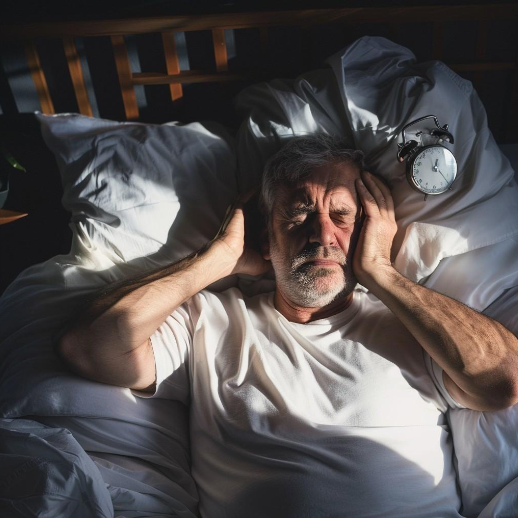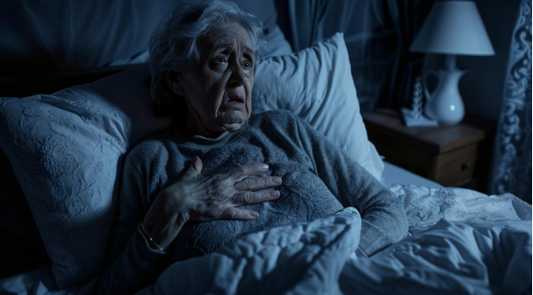As we age, a restful night of sleep often becomes elusive, with insomnia affecting a significant number of seniors. This isn’t just about the inconvenience of tossing and turning; poor sleep can hit health hard. From mood swings to memory lapses, the fallout is real. But there's hope in natural remedies that don't involve the grogginess of
over-the-counter solutions. Imagine sipping a soothing cup of chamomile tea or trying out the calming effects of lavender before bed. These simple, effective remedies can make a world of difference. Let's explore how seniors can embrace nature’s gifts and reclaim their nights with confidence.
Understanding Insomnia in the Elderly
For seniors, a good night's sleep can sometimes feel like chasing shadows. Just when you think you've got it, it slips away again. Insomnia isn't just an inconvenience; it's a real obstacle that affects millions of older adults. But what exactly causes this sleeplessness, and how does it impact the health of our aging loved ones?
Common Causes of Insomnia
The factors leading to insomnia in the elderly are often quite complex. Below are some of the usual suspects:
- Medications: Many seniors take various prescriptions that might keep them up at night. Some medications have stimulating effects or side effects that interfere with sleep.
- Chronic Pain: Aches and pains don't take a break at bedtime. Conditions like arthritis or neuropathy can make it difficult to find a comfortable position to sleep in, leading to restless nights.
- Anxiety: Thoughts can become troublesome as the world quiets down. Anxiety about family, health, or other concerns can prevent the mind from relaxing, making sleep elusive.
- Hormonal Changes: As we age, our body's production of sleep-regulating hormones like melatonin may decrease, making it harder to stay asleep.
These factors can create a frustrating cycle of sleeplessness, often worsening each other.
Effects of Insomnia on Health
Insomnia doesn't just rob the elderly of their nightly rest; it can have profound impacts on overall health:
- Cognitive Decline: Lack of sleep is like running a marathon without training. It can speed up mental decline, affecting memory and decision-making abilities over time.
- Increased Risk of Chronic Diseases: Studies suggest that poor sleep can contribute to heart disease, diabetes, and even obesity. It's like a domino effect that can lead to serious health issues.
- Emotional Well-being: Sleep and mood are like dance partners; one can't keep rhythm without the other. Insomnia often leads to irritability, depression, and overall lower quality of life.
It's a sobering reality that emphasizes why tackling insomnia is crucial for maintaining a healthy, fulfilling life. Sleep isn't just a necessity—it's a linchpin for living well.
Natural Remedies for Insomnia
Struggling with sleep? You're not alone, especially if you're in your later years. As we age, getting enough quality sleep can become more challenging. But before reaching for that prescription bottle, let's explore some natural remedies that could help you drift off more peacefully.
Herbal Remedies
Herbal remedies have been used for centuries and may provide some relief to those struggling to fall asleep. Here are a few time-tested herbs that can help:
- Valerian Root: Known for its sedative properties, valerian root can reduce anxiety and promote sleep. Taken as a supplement or tea, it can be a natural way to soothe your restless nights.
- Chamomile: This popular herb can be consumed as tea before bedtime to act as a mild tranquilizer. Its calming effects might be just what you need to relax and prepare for a night of restful sleep.
- Passionflower: Often used to treat insomnia, passionflower may help reduce anxiety and improve sleep quality. It's available in various forms like tea or tincture, making it easy to incorporate into your bedtime routine.
Nutritional Supplements
Sometimes, what our bodies need are essential nutrients to help improve sleep patterns. Here are some supplements known for their sleep-enhancing properties:
- Melatonin: This hormone regulates your sleep-wake cycle. Taking melatonin supplements can help recalibrate your internal clock, especially if you have trouble falling asleep.
- Magnesium: Known to relax muscles and calm the nervous system, magnesium may help you fall asleep faster and enjoy better sleep quality.
- L-theanine: Found in tea leaves, this amino acid can promote relaxation and ease anxiety, potentially leading to better sleep.
Lifestyle Changes
Incorporating some simple lifestyle changes can also make a huge difference in your sleep quality:
- Sleep Hygiene: Keeping a consistent sleep schedule, maintaining a comfortable sleeping environment, and avoiding screens before bed can be incredibly beneficial.
- Relaxation Techniques: Practices like meditation, yoga, or deep breathing exercises can help calm the mind and prepare your body for sleep.
- Bedtime Routines: Establishing a routine before bed, like reading or taking a warm bath, can signal your body that it's time to wind down.
Aromatherapy and Essential Oils
The power of scent is not to be underestimated when it comes to sleep:
- Lavender Oil: Widely recognized for its calming effects, lavender oil can be used in various ways to enhance sleep. Apply a few drops to your pillow or use a diffuser in your bedroom.
- Other Essential Oils: Oils like chamomile, cedarwood, and ylang-ylang can also create a calming environment, encouraging relaxation and sleep.
These natural remedies reflect a gentle yet effective approach to improving sleep quality. By integrating these options into your nightly routine, you might find yourself drifting into dreamland more easily and waking up refreshed. So why not give these methods a try?
After all, a good night's sleep could be just a cup of chamomile tea or a dab of lavender oil away!
When to Seek Professional Help
Getting a good night's sleep is often like catching a shooting star—everyone dreams about it, but not everyone gets to see it. For many seniors, insomnia can turn this dream into a nightly struggle. While some sleep disruptions can be managed at home, there are times when it's wise to seek professional help. How do you know when to take that step? Let's delve into this question by examining the signs and the significance of working with healthcare providers.
Signs of Severe Insomnia
Sometimes, insomnia isn't just an occasional visitor but a troublesome guest that refuses to leave. Recognizing the signs of severe insomnia can help you determine when it's time to seek a healthcare professional's advice. Here are some symptoms to watch out for:
- Chronic sleeplessness: If you're unable to sleep at least three nights a week for more than three months.
- Daytime fatigue: Feeling excessively tired or drowsy during the day, even after a full night in bed.
- Mood changes: Experiencing irritability, depression, or anxiety due to lack of sleep.
- Memory problems: Difficulty remembering things or concentrating can often be linked to poor sleep.
- Increased accidents: Whether it's tripping more often or minor car accidents, memory lapse-related mistakes are a red flag.
If any of these symptoms cause concern, don't brush them off like crumbs from a table. Serious insomnia can impact your overall health, making an evaluation by a healthcare professional crucial.
Collaborating with Healthcare Providers
Having frequent sleep problems? It might be time to team up with your doctor. Doctors can help unravel the mystery behind your sleep woes and offer solutions tailored to your needs. Here’s how to make the most of this partnership:
- Open conversations: Be honest about your symptoms and sleep habits. Discuss any over-the-counter medications or home remedies you’ve tried.
- Medication review: Some prescriptions might impact sleep. Let your doctor know everything you’re taking, and they might adjust dosages or suggest alternatives.
-
Explore therapies: Professionals can recommend therapies like cognitive behavioral therapy for insomnia (CBT-I) that might better suit your needs than medications.
- Regular follow-ups: Keep appointments to track your progress and tweak the treatment plan as necessary.
Working with a healthcare provider isn't just about getting a prescription; it's about finding the best path to peaceful, restful nights—your own roadmap to dreamland. Listening to your body and taking action when needed can make all the difference in reclaiming your nights and enjoying better days.
Conclusion
Natural remedies for insomnia can offer a safe and effective solution, especially for the elderly. From herbal teas like chamomile and valerian root to supplements like melatonin, these options support restful nights. Incorporating calming routines and lifestyle changes can further enhance sleep quality.
If you or a loved one struggle with sleep, explore these remedies. Experiment to find what works best for your individual needs.
Remember, better sleep leads to better health, so don't hesitate to seek out what truly helps you rest well.
Share your experiences and tips with us or dive into further topics about achieving restful sleep.
P.S.
If you are having difficulty with sleeping, you are not alone. There are many folks out there who want to know what the most effective natural sleep aid is to get them back to snoozing again. Fix My Sleep is a great resource for all those who have trouble sleeping and are looking for innovative tips and sleep products to help them get a good night’s sleep.

![Top Natural Insomnia Remedies for Seniors [Updated 2024]](http://www.fixmysleep.co/cdn/shop/articles/Screenshot_13_1100x.png?v=1724718571)



